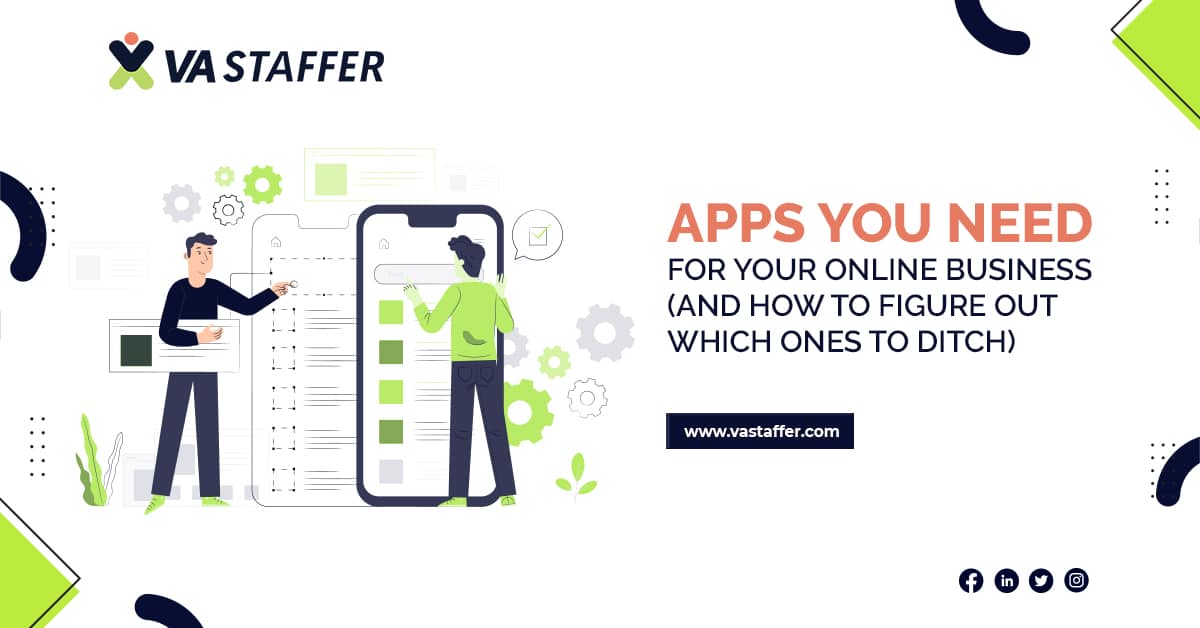Having a remote team means the ability to work from home or anywhere. Managing a remote team involves juggling many different tasks, staying on top of deadlines, collaborating with the team, and managing the business budget. Thankfully, there are many apps out there that will make your job easier.
But because there is a gazillion of apps to choose from, it can be daunting to pick the right one that’s right for your business. Apps aren’t one-size-fits-all — users can tailor-fit to the company’s specific needs and budget. Here’s what you need to know about choosing the right apps for your business.
What Is an App?
An app is a software program designed for a specific task or function, usually on an electronic device such as a computer or smartphone. Apps can be free or paid, but most businesses that use them will pay for them because of their added value.
Why Use Apps?
Apps make life easier for small business owners by providing access to features that would otherwise require manual labor or cost thousands of dollars in equipment, like servers and programming time. They also allow companies with limited staff or resources to manage their business more efficiently by automating customer service and product delivery processes while saving time and money by having employees dedicated to those tasks.
Helpful Apps For Your Online Business
1. Storage App
Cloud storage has become one of the most convenient and efficient methods of storing data online. There are many cloud storage service providers on the internet. This area is so vast that every big tech company owns a separate storage facility, which helps generate a significant revenue margin from users. In cloud storage, rather than saving data locally or on your hard drive, you can store data somewhere at a remote location, which can be accessed using internet service. Various cloud storage service providers sell storage services for different ranges.
Examples: Dropbox and Google Drive
2. Communication App
Communication is the cornerstone of any successful business, and if it’s important to you, you should look into one of these communication apps. They will help you communicate better with your team and clients and offer features like group organization options and video meeting capabilities that you won’t find in a text or email.
Examples: Skype, Microsoft Teams, Google Meet, Zoom, Slack
3. Project Management App
When running your own business, it’s easy to get distracted by the day-to-day tasks and lose sight of the bigger picture. But if you keep your eye on the prize and stay organized, you’ll be able to grow your business into a successful enterprise. Stay organized, create a workflow, cross tasks off your to-do list, streamline your processes, increase efficiency, and do anything else involved in your business management.
Examples: Asana, Monday.com, Trello, Basecamp, and Evernote
4. Accounting and Finance Apps
Although accounting is one of the most important aspects of running a business, it can also be one of the most complex. These small business accounting apps can help you catalog and organize your finances, invoicing, expenses, payroll, etc.
Examples: Xero, Quickbooks, and FreshBooks
5. Real-Time Collaboration and Storage App
When running a small business, you must delegate tasks to talented people — think designers, copywriters, project managers, and your significant other. If you don’t have the right tools to keep everyone on the same page, it’s easy to miscommunicate. This app will help you share files, organize ideas, and stay up-to-date on your team’s to-do lists.
Example: Google Workspace
6. Email Management App
As the most cost-effective form of marketing, email marketing can yield great results. According to some reports, it can be worth up to $44 for every dollar spent on this type of campaign. That’s why ensuring you have the right tools to succeed with your email marketing is essential.
Example: Mailchimp, Campaign Monitor
7. Inventory Management
If you sell products, an inventory management app can help you keep track of your stock, make purchase orders, and ensure the smooth running of your sales process.
Example: SOS Inventory, Delivrd, Sortly
8. Time Management and Tracking
Managing a team can be challenging when you’re juggling multiple employees, different schedules, and multiple responsibilities on your plate. These scheduling, HR, and time-tracking apps can make managing your team much more effortless.
Example: Time Doctor, Hubstaff, Clockify, Teamdeck, HotSchedules, Toggl
9. Customer Relationship Management
It’s hard to keep track of your customer relationships, especially if you’re a small business with limited resources and funding. These apps can help you manage customer profiles, run loyalty programs, and more.
Examples: Salesforce, Zoho, Nimble, Belly
10. Payment Processing App
A payment processing app is a software connecting your credit card to an online payment system. It allows you to make online payments quickly and easily. To make a transaction successful, you need a payment processor gateway. The primary purpose of this gateway is to notify the processor about the acceptance or decline of payment.
Example: Paypal, Venmo, Stripe, Square, Razorpay
Users with previous negative experiences with apps and platforms would avoid brands that deliver poor experiences. Most consumers are willing to take their business elsewhere if they aren’t happy with the digital experience they receive, even if they love the tool.
It’s not just about having a solid digital presence but also delivering a positive customer experience across all touchpoints and channels. If the customers aren’t happy with how the app performs, they probably won’t be satisfied with it and most likely ditch the tool.
How to Figure Out Which Ones to Ditch
If you can get the same results at a lesser cost then obviously go for the less costly one. Or, if the more expensive one offers more support and functions then it’s probably worth spending the extra dollars.
There are apps that offer only one type of function and thus offer superb service because it’s their specialty. And there are some apps that have different functions. Figure out which apps you can ditch by using only one app so you cut costs.
Talk to the team about how each member uses the apps so that you can remove the ones that are redundant.
Apps are vital in building your online business so learn to use them wisely.


